Power System Protection Coordination
IEEE-NCS, IAS/PES Presents
Tuesday, November 5th, 2013, 5:30pm to 9:00pm, doors open at 5:00pm
Power System Protection Coordination
GOLD Guest Speaker
To Make Smart Meters “Smart”
Download the .pdf notice here: IEEE-NCS, IAS-PES Presentation Notice for 5-November-13
Abstract:
Our November Technical Seminar is a joint presentation that will include two parts. The two parts address our members’ request to discuss the subject as indicated in the title. Each Part will be presented as follows:
- Part 1: (Rasheek Rifaat, P.Eng, Sr. Member IEEE): Protection System Coordination for Distribution and Industrial Power Systems
- Part 2: (Peter Sutherland, Fellow IEEE ):Selectivity and Zone Selective Interlocking for Low Voltage Circuit Breakers
Part 1:
Since the inception of industrial electrical systems, coordination tasks were performed to ensure that protection systems would operate with the necessary reliability and security. The tools to perform such tasks have evolved from the use of a glass table with light and log-log curve sheets into computer base programs with GUI. Meanwhile, protective devices have also gone through advancements from the electromechanical devices to the multifunction, numerical devices. Throughout the changes in coordination tools and protective device configurations, a good number of protection coordination principles remain with us. In addition, new techniques are developed to assist us the use of protection system to reduce arc flash energy in addition to basic protection functions. Part 1 will discuss the principles and basics of protection system coordination, the developments in the coordination programs and present day multifunction numerical devices used in distribution and industrial systems.
Part 2:
Time Current curve overlays are no longer sufficient for performing protective device coordination studies. In 2005, National Electrical Code articles 700.27 (Coordination for Emergency Systems) and 701.18 (Coordination for Legally Mandated Standby Systems) first required fully coordinated systems. Due to arc flash and electrical safety concerns, turning instantaneous off, increasing delay times or increasing pickup currents are no longer good enough. Industry has responded by publishing selectivity tables as a tool in addition to traditional curve overlays. Analytical methods such as peak let-through analysis are often used to generate tables. Selectivity tables assume “upstream” CB’s instantaneous trips are set to maximum or off. There are now multiple methods to achieve selectivity, while still using instantaneous protection set at low sensitive pickups, all the way to the first MV devices. These include: Energy nesting, WFR (Waveform Recognition) and I-ZSI (Instantaneous Zone Selective Interlocking). These methods allow for meeting the combined goals of arc flash reduction and fully coordinated systems.
Presenters’ Brief Bios
Dr. Peter Sutherland; Fellow IEEE, Dr Sutherland received the B.S at University of Maine at Orono and the PhD at Rensselaer Polytechnic Institute. For over twenty years, Dr. Sutherland has specialized in electrical power system studies, teaching and research. After joining GE in 1987, he led a wide variety of power system studies. He worked in GE’s Industrial Power Systems Engineering Operation (1987-89), the GE Training and Development Center (1989-92), the Albany office of Installation and Service Engineering (1993-96), Power Systems Energy Consulting (1996-2001) , GE Industrial Solutions (2005-2013). He is now a Grid Interconnection Engineer for GE Renewables. He is a Fellow of the IEEE and a PE in NY and three other states
Mr. Rasheek Rifaat, P.Eng, Sr. Member IEEE; Rasheek Rifaat is electrical engineering supervisor at Jacobs Canada, in Calgary, Alberta and a senior member of the IEEE. He has been an active member of both the Industry Applications (IAS) and Power and Energy (PES) Societies of the IEEE. He is the past chair of the Power Systems Protection Committee of the Industrial & Commercial Power System Department of the IAS. Presently, he is the Chair of the Protection and Coordination Work Group which oversees 3004 Standards Collection on Protection and Coordination. Mr. Rifaat is a registered professional engineer in 4 Canadian Provinces and has been practicing electrical engineering for 40 years. He authored, coauthored and presented over 30 technical papers, a number of them on subjects associated with protection and coordination systems.
GOLD Speaker:
To promote the Graduates Of the Last Decade (GOLD) we have a 15 minute opening presentation from a GOLD Guest Speaker on To Make Smart Meters “Smart”
Make Smart Meters “Smart”: Are smart meters truly “smart” yet? Utilities and meter manufacturers keep claiming that smart meters can help ordinary customers understand their energy usage patterns better and further reduce their bills. However, the key step to achieve this is to know the energy consumptions of individual appliances in your house, not the total consumption. A new technology based on artificial intelligence has been developed in U of A to make this possible. It can be integrated with future smart meters to make them truly “smart”.
Biography: Ming Dong received his PhD degree in Electrical Engineering from University of Alberta in 2013. He is now working for ATCO Electric. He has a variety of research interests including smart meter, machine learning, power quality, grounding & bonding, arc flash and power system protection.
Agenda:
Gold Speaker Time: 6:00pm
Seminar Start Time: 6:25pm
Doors Open: 5:00pm
Online Registration
https://meetings.vtools.ieee.org/meeting_view/list_meeting/20953
IEEE Members: $20
Non-IEEE members: $30
IEEE Student Members: $10
Non-IEEE Student: $12.5
IEEE Life Member: Free
At the door registration:
IEEE Members: $25
Non-IEEE members: $35
IEEE Student Members: $15
Non-IEEE Student: $17.5
IEEE Life Member: Free
****Please note: Online registration closes one week before the event****
Location:
German Canadian Cultural Centre
8310 Roper Road, Edmonton
For more details for the event or registration questions or concerns please contact the event coordinator Brett Matthiessen at brett.matthiessen@atcoelectric.com. Alternately, contact Peter Rothwell at prothwell@igbtech.com.
Event Sponsor:
Sponsorship opportunities still exist.
Yearly Corporate Sponsors:
Please contact us if you are interested in becoming a corporate sponsor


